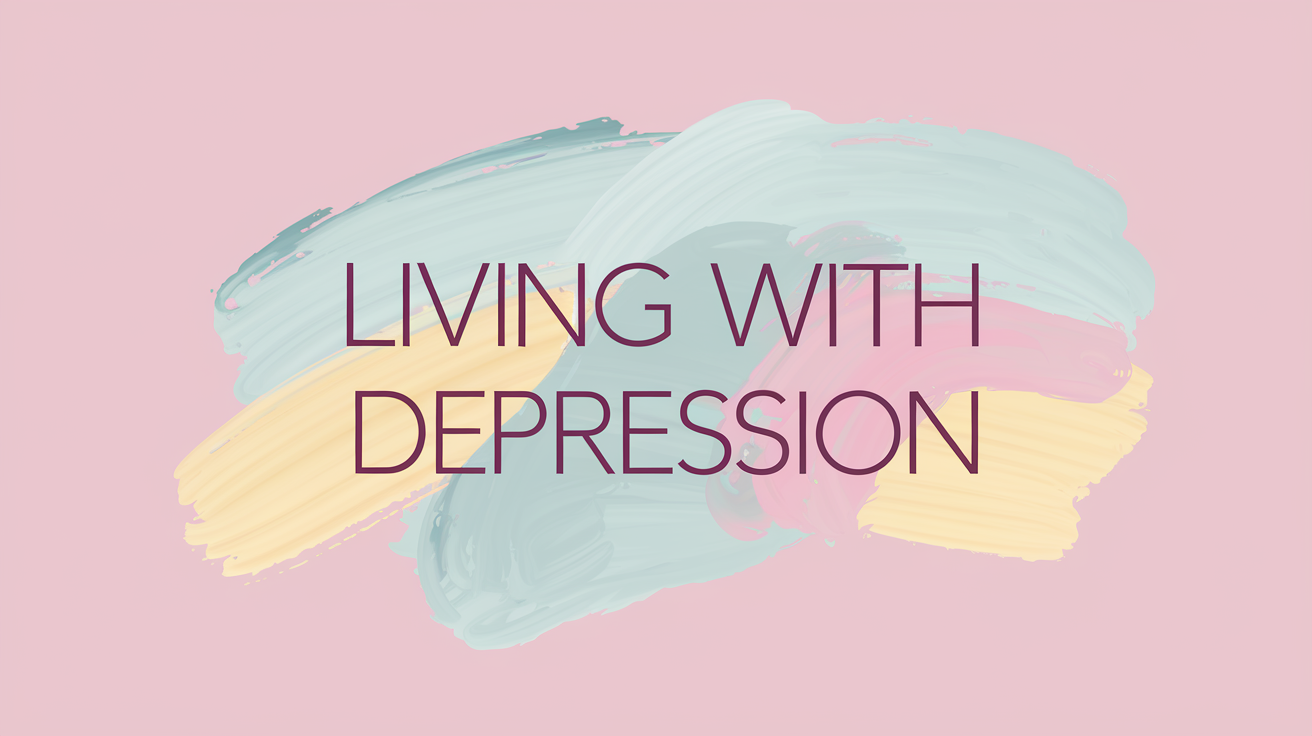
Living with Depression: Understanding the Silent Struggle
Living with depression is like showing up to a sold-out rock concert and feeling completely out of tune with the energy around you. The lights are bright, the crowd is buzzing, and everyone else seems to be moving to the rhythm—yet inside, you feel disconnected, numb, and unseen. That disconnect is at the heart of depression. It’s not always visible, but it is always real. Depression can affect anyone, regardless of their background, personality, or strength. And often, the ones smiling the most are the ones struggling the hardest behind the scenes. This post is not about statistics or shallow motivation. It’s about helping people better understand what it means to live with depression—and how to approach it with more empathy, honesty, and humanity.
Depression isn’t just feeling sad. It’s a heavy, unrelenting fog that can settle into someone’s life for days, weeks, or years. It drains energy, silences joy, and distorts thinking. People with depression often experience deep fatigue, hopelessness, guilt, isolation, and a sense of emptiness that doesn’t go away with sleep or distractions. They may look okay on the outside, but inside, they’re constantly pushing through invisible barriers. Understanding depression means acknowledging that it’s not a weakness or a mood swing—it’s a legitimate health condition that deserves care, support, and compassion.
Smiles Don’t Always Mean Healing
One of the most harmful misunderstandings about depression is the belief that if someone is laughing or seems upbeat, they must be doing fine. But many people living with depression become experts at hiding it. They smile, go to work, make jokes, and say they’re okay—while internally battling thoughts and feelings that are anything but okay. These “good” days are often survival strategies. They don’t mean the depression is gone. They mean the person is doing everything they can to stay afloat.
Assuming someone is fine based on how they act outwardly creates dangerous expectations. It can make people feel pressured to keep performing happiness and afraid to be honest about how they’re really doing. It also leads to disappointment and confusion when someone who “seemed fine” says they’re struggling or even has a mental health crisis. True support requires looking beyond surface behavior and checking in without assumptions. It means listening when someone says they’re tired—not just physically, but emotionally and mentally—and believing them.
Depression Is Unpredictable
People with depression often describe it as a rollercoaster, or a wave that comes and goes without warning. One day they might be able to get out of bed, go for a walk, or finish tasks. The next day, even brushing their teeth or sending a message can feel impossible. This inconsistency doesn’t mean they’re lazy or not trying—it means they’re living with a condition that affects how much energy and motivation they can access at any given time.
The unpredictable nature of depression can make daily life hard to manage. It interferes with plans, routines, and responsibilities. People may cancel outings, miss deadlines, or withdraw from others—not because they don’t care, but because they’re overwhelmed by exhaustion, anxiety, or numbness. Offering support during these moments means practicing patience. It means not taking it personally when someone needs space and not judging their effort based on what they were able to do yesterday. Understanding these patterns helps us respond with compassion instead of frustration.
The Emotional Weight Behind the Silence
Depression isn’t always loud. It’s often silent, dragging people into isolation. The emotional weight of depression can make even basic decisions—like what to eat or whether to return a text—feel overwhelming. It creates an inner voice that says, “You’re not good enough,” or “No one wants to hear from you.” This voice can become so loud that it drowns out everything else, including love, encouragement, and logic. It’s not a matter of thinking positively—it’s a matter of surviving minute by minute.
Because depression is so internal, people who suffer often feel misunderstood. They may try to explain their experience and be met with confusion, invalidation, or suggestions to “cheer up.” That makes them retreat further into themselves. To support someone living with depression, you don’t need to have the perfect words. You just need to create space where they can be honest without being judged, fixed, or rushed. Let them talk. Let them cry. Let them be quiet. Your presence matters more than you may ever realize.
The Limits of “Staying Busy”
A common myth is that staying active or busy is the answer to depression. While exercise, hobbies, and social interaction can help some people feel better temporarily, they are not cures. Telling someone with depression to just keep busy can come off as dismissive. It implies their condition is a result of idleness rather than something much deeper and more complex.
What’s important is helping people engage with life in a way that’s manageable for them. That might mean taking a walk, but it might also mean just getting out of bed or showering. These small victories can feel like mountains—and they deserve to be acknowledged. Encouraging activity without pressure, and recognizing effort over outcomes, shows that you understand the real struggle behind every step forward. Depression isn’t cured by filling a calendar—it’s supported through care, choice, and realistic goals.
Simple Answers Can Do More Harm Than Good
Saying things like “You just need to be more positive,” “Others have it worse,” or “Everything happens for a reason” may be intended as comfort—but they rarely help. These phrases can make people feel invalidated, guilty for feeling how they feel, or like their experience is being minimized. Depression is not a puzzle to be solved with clichés. It’s a layered experience that needs real listening, patience, and empathy.
The truth is, most people living with depression don’t want someone to fix them. They want someone to understand them. They want to be seen—not as broken or dramatic—but as human beings carrying a lot more than they’re letting on. By avoiding oversimplified advice and replacing it with curiosity and compassion, we offer something much more powerful: connection.
Self-Care and Boundaries Are Survival Tools
Depression often demands a level of self-care that others may not understand. Canceling plans, limiting interactions, or needing more sleep isn’t about flaking out—it’s about preserving energy and avoiding emotional overload. Respecting someone’s boundaries when they’re struggling shows trust and maturity. It says, “I believe you know what you need right now.”
It’s also essential for people with depression to be kind to themselves when setting those boundaries. The guilt of not being “productive” or “fun” can be intense, especially in a culture that idolizes constant motion. But healing isn’t linear, and energy isn’t endless. Allowing space to rest, recharge, or just breathe is not selfish—it’s necessary. Encouraging this without shame helps remove the pressure to “perform wellness” and supports real recovery.
Emotions Can Hit Harder and Deeper
Depression doesn’t just bring sadness. It intensifies everything. A minor disappointment can feel like a deep failure. A small conflict can trigger overwhelming anxiety. A simple task can bring crushing dread. People experiencing depression are not being dramatic—they’re reacting from a place of depleted emotional reserves. Their nervous systems are on edge, their thoughts can spiral quickly, and their ability to self-soothe may be weakened.
Understanding this emotional intensity helps us respond with care instead of criticism. We can offer calm, grounded presence instead of pressure. We can be more mindful of our words, tone, and timing. Knowing that depression amplifies emotion doesn’t mean walking on eggshells—it means offering consistent, gentle support and responding to distress with steadiness rather than surprise.
Shifting the Way We See Depression
Changing the way society sees depression starts with changing how we talk about it—at home, in schools, online, and with ourselves. It means calling it what it is: a valid health condition, not a weakness. It means acknowledging that high-functioning depression is still depression. That people can be successful, smart, funny, and still feel completely broken inside. That depression doesn’t always look like sadness—it can look like silence, irritability, or detachment.
As someone who writes and creates through Colorless Spirit, my goal is to offer messages that feel real, not polished. Mental health isn’t a trend or a product—it’s a deeply personal, ongoing part of life. When we allow people to tell their stories without fear of being dismissed or misinterpreted, we make room for healing—not just individually, but collectively. That’s the heart of breaking the stigma.
This Isn’t the End of the Song
As we reach the close of this honest and heartfelt reflection, remember: living with depression doesn’t mean your story stops here. Just like a powerful song that slows into a quiet bridge, it’s a pause—not a finale. The weight you carry may be heavy, the silence may echo loudest at night, but you are still part of this world’s melody. Your voice matters, even when it trembles. Your presence counts, even when you feel invisible.
Depression can distort how we see ourselves, convincing us we’re broken or alone. But that’s not the truth. You’re still here. And that alone speaks volumes. Every breath, every step, every choice to face another day adds to your strength. You are not weak for struggling—you’re strong for surviving.
So ask yourself: What are the quiet wins you’ve had lately? What helps you keep going, even if only for a moment? Is there someone who might benefit from hearing your story too? You’re not obligated to be perfect—just present.
Let this be your reminder that even in the shadows, your song isn’t over. This chapter may feel heavy, but it’s not the end. Hold on for the next verse. A softer rhythm may come. A lighter note may rise. And when it does, you’ll be there to hear it. Keep playing. Keep singing. You are part of something meaningful—something that still has so much more to say.



